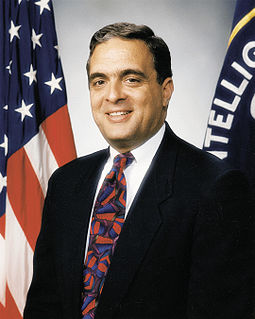A Quote by David Ignatius
I believe, that there is at least de facto cooperation between United States and Iran, at least in Iraq.
Quote Topics
Related Quotes
It was not the United States who invaded Kuwait; it was Iraq. It was not the United States that went to war with Iran; it was Iraq. It was not the United States that fired chemical weapons at Iran; it was Iraq. And it was not the United States that murdered innocent Iraqi citizens with chemical weapons; it was Iraq.
I do believe that the very tense relationship between the United States and Iran presents a challenge to the United States. But to discuss Iran as that type of a threat I find somewhat unconvincing, mindful of the fact that Iran actually doesn't have those military capabilities that would be needed to refer to it as that type of threat.
Allowing an independent and sovereign Iraq could be a nightmare for the United States. It would mean that it would be Shi'ite-dominated, at least if it's minimally democratic. It would continue to improve relations with Iran, just what the United States doesn't want to see. And beyond that, right across the border in Saudi Arabia where most of Saudi oil is, there happens to be a large Shi'ite population, probably a majority.
Iran did not talk to the United States for 35 years. And now we are talking. And I believe these talks are useful. But they haven't produced the intended results. We have not seen an end to the hostility that has been exhibited in the United States against Iran. And I believe it is important that we see some of that.
Since United States military operations in Iraq began in 2003, I have visited Iraq at least 15 times. But unlike politicians who visit, the question for me has never been why the U.S. got into Iraq. Instead, as the CEO of Blackwater, the urgent question was how the company I head could perform the duties asked of us by the U.S. State Department.
I made a movie to explain to the American public what had been achieved in regards to disarmament of Iraq and why inspectors aren't in Iraq today and detailing the very complex, murky history of interaction between Iraq, the United Nations and the United States. It is most definitely not a pro-Iraq movie. It is a pro-truth movie.
The Iranians are Moslems and the Iraqi are Moslems. Both are certain that there is no God but Allah and that Mohammed is his prophet and believe it with all their hearts. And yet, at the moment, Iraq doesn't trust Iran worth a damn, and Iran trusts Iraq even less than that. In fact, Iran is convinced that Iraq is in the pay of the Great Satan (that's God-fearing America, in case you've forgotten) and Iraq counters with the accusation that it is Iran who is in the pay of the Great Satan. Neither side is accusing the Godless Soviets of anything, which is a puzzle
Since 1981, after our nations severed diplomatic relations, we've worked through a international tribunal to resolve various claims between our countries. The United States and Iran are now settling a long-standing Iranian government claim against the United States government. Iran will be returned its own funds, including appropriate interest but much less than the amount Iran sought. With the nuclear deal done, prisoners released, the time was right to resolve this dispute as well.
It's easy to say, let's go in and get the bad guys. But you have a divided country of Sunnis and Shias. The United States goes and takes action there on behalf of the Iraqi government. You've got Iran coming in and saying we're going to stand with Iraqi Prime Minister Nuri al-Maliki, so now we're aligning ourselves with Iran, and if we do air strikes, becoming de facto air force for them.







































